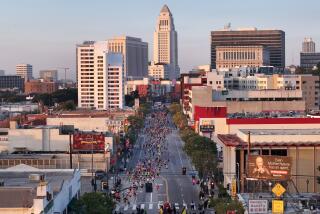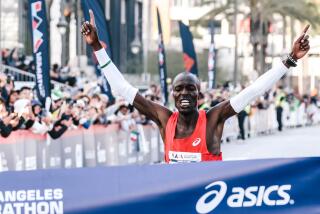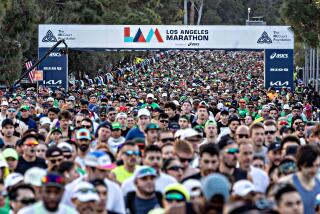Grete Waitz dies at 57; marathoner was a trailblazer for female distance runners
Norway’s Grete Waitz almost gave up on competitive running before her 25th birthday.
Just in time, she found the marathon — or it found her when charismatic New York City Marathon director Fred Lebow invited Waitz to run his race in 1978.
Over the next decade, in what was something of a second career, Waitz became one for the ages — as an athlete and catalyst in the development of women’s distance running.
Then, for more than two decades after the last of her nine New York marathon wins in 1988, she became a force in promoting children’s health and well-being through her sport.
Waitz died Tuesday in Oslo after a six-year fight with cancer. She was 57.
Waitz won the gold medal in the inaugural world championship women’s marathon in 1983, the silver medal in the inaugural Olympic women’s marathon at the 1984 Los Angeles Games and set four marathon world records, three in New York and one in London.
“I’ve lost a very good friend and true champion and competitor,” said 1984 Olympic marathon champion Joan Benoit Samuelson. “She influenced my life in so many ways and was very much a part of my family. You can’t even begin to add up her contributions to sports — not just women’s sports, all sports.’’
Waitz also won five world titles in cross-country.
“She paved the way for me and so many others to thrive in the sport,” said Deena Kastor, U.S. record-holder in the marathon and 2004 Olympic bronze medalist.
“What I remember most about Grete was what she gave to youth in sport, to sharing the benefits of running with kids. You would always see a big smile on her face when she was surrounded by 200 kids in Central Park.’’
Central Park is where Waitz, a former schoolteacher who had no children, went from a fine track runner to a legendary road runner, becoming the face of the New York marathon in an era when the race went from local curiosity to global cultural phenomenon.
“In combination with Fred [Lebow], Grete created the vision of what we know as the urban marathon,” said Runner’s World magazine editor-at-large Amby Burfoot, the 1968 Boston Marathon champion. “By being on center stage in New York, the world’s media capital, she did a lot to stimulate the women’s running boom.”
Waitz was born in Oslo on Oct. 1, 1953, and began running competitively in her youth.
As she entered her 20s, road racing was a male domain, and there were no Olympic track races longer than 1,500 meters for women. In 1976, she set a world record in the 3,000 meters but had no choice other than to run the 1,500 at the Olympics later that year, just as she had done in 1972, failing to reach the final either time.
Ten years after her final Olympics as a track runner, Waitz would say that being limited to shorter distances for so long was critical to her sudden marathon success. It began when she set a world record of 2 hours, 32 minutes, 30 seconds in her debut at the distance — a race for which Lebow had selected her to be a rabbit, or pace-setter, for the presumed leaders.
“My first New York marathon, I didn’t know what to expect,” Waitz told the Chicago Tribune in 1986. “And I didn’t know that people would make such a big thing out of it after I won. That race kept me in the sport longer. It was at a point in my career where I was seriously thinking about retiring because of a lack of long distance for women on the track.
“To be honest, I think my timing was lucky. The fact we didn’t have the choice to run long distances really forced me to develop my speed. When I started to run [marathons], I had so much more speed than my competitors. You see, in marathon running today, most of the best are coming from track running.”
Waitz had lowered her personal best to 2:24:54 by the time she won her ninth New York marathon, six weeks after an injury kept her from finishing the 1988 Olympic marathon.
She is survived by her husband, Jack Waitz; and two brothers.
More to Read
Start your day right
Sign up for Essential California for the L.A. Times biggest news, features and recommendations in your inbox six days a week.
You may occasionally receive promotional content from the Los Angeles Times.






